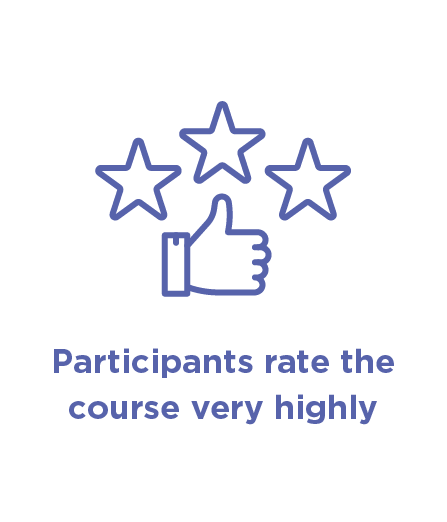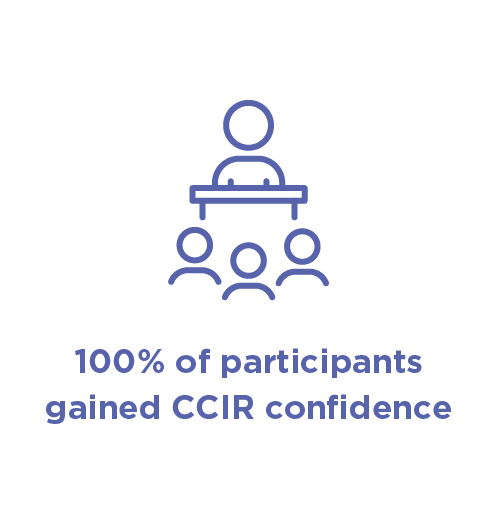The Health Translation South Australia is an NHMRC-accredited Research Translation Centre. We collaborate to deliver research-informed healthcare and training. The below case studies highlight our work in translating research into better health outcomes and building capability across the system.
Case studies on this page:
- Developing, re-designing or adopting platforms, systems or workforce initiatives: A Capacity Building Platform to build research translation competence and capability in SA
- Providing better care: The Actionable Intime Insights (AI2) Project: Reducing the impact of mental illness relapse
- Meeting the needs of your end-users in your population: Supporting clinician-researchers to enhance research impact and reach

Case studies from all Research Translation Centres are available from Impact and outcomes.
Developing, re-designing or adopting platforms, systems or workforce initiatives: A Capacity Building Platform to build research translation competence and capability in SA
Challenge
Funding bodies globally are prioritising projects that have potential to demonstrate impact in practice, policy and health outcomes.
Many researchers and health professionals lack research translation skills, and a growing need was emerging for targeted training.
Approach
Health Translation South Australia (HTSA) developed a Capacity Building platform to build research translation (RT) knowledge, skills and capability in South Australia, including:
- HTSA Research Translation Essentials: A 2 day in-person research translation training course was first delivered in 2022 and is now held twice a year with up to 40 attendees per course. Curated sessions introduce 9 key RT competencies: Consumer and Community Involvement in Research (CCIR), collaborating with policy makers, stakeholder engagement, doing Aboriginal research the right way, co-design, engaging with industry, implementation science, measuring project value and impact and communicating impact
- HTSA Spotlight Series: provides online learning opportunities and resources in competencies of research translation
- HTSA Consumer and Community Involvement in Research Masterclass: a one day in-person course providing researchers and consumers with the knowledge and practical skills to upskill in CCIR. It facilitates the immediate commencement of partnerships between researchers and consumers and communities
- HTSA Implementation Science Network: this training and mentoring network, led by an expert Implementation Science (IS) Executive Group, brings together people with different levels of experience in IS to upskill, share learnings and collaborate at both an individual and organisational level.
In addition, HTSA contributes to building the evidence in this space by co-authoring publications with key partners.1,2
Significance
Research Translation Essentials: Participants rate the course very highly, and their understanding of RT has increased from 4.0 to 6.9 out of 10 after the course – a 72.5% improvement.
Spotlight Series: Over 3 years, 36 Spotlight Series webinars have been delivered across 9 different RT competencies.
CCIR Masterclass: 100% of survey respondents were significantly more comfortable partnering on CCIR activities following the course.
Implementation Science Network: Attendees valued connecting with IS experts who share advice that enables them to address the 'implementation gap' in translation projects and grant applications.




Value-add of centre
HTSA leveraged our in-house expertise and mobilised experts from across our partner and stakeholder organisations to unite around the shared goal of building the research translation capacity across SA.
Without HTSA’s coordination and access to the Australian Health Research Alliance (AHRA) Network, South Australian researchers, clinicians and consumers would not have access to this high-quality training and resources.
‘I thoroughly enjoyed this course and found that everything could be applied to what I do! I learned so much over the two days and plan to apply many of the things I learned! I loved the interactive elements too.’Research Translation Essentials attendee, April 2024
Reach
Research Translation Essentials: Course has been delivered to 162 individuals from 33 organisations spanning academia, health services and government. Since April 2024, HTSA has been targeting non-metro attendees (n=12).
Spotlight Series: 802 people (students, researchers and clinicians) attended the 36 webinars. The HTSA YouTube channel has attracted 2,400 views (June 2022 to Dec 2024).
CCIR Masterclass: Pilot delivered to 30 attendees (11 consumers, 19 researchers) in November 2024. There are 27 people registered for 2025.
Implementation Science Network: There are 211 members of the HTSA Implementation Science Network which meet quarterly.
Next steps
Continue to expand the reach through diverse promotional activities and iteratively improve the content of all activities by ensuring open communication with participants, continuous evaluation and improvement.
References
1 Lynch, E., Earle-Bandaralage, L., Eley, S., Gancia, A., Larcombe, S., Muthuralingam, S., Townsin, L., Wardill, H. and Corsini, N., 2025. Credit where it’s due: Recognising lived experience in research authorship. Patient Education and Counseling, 130, p.108472.
2 Zakershahrak, M., Linedale, E., Eley, S., McMillan, P., Earle, L., Freeman, H. and Keech, W., 2025. Understanding Australian Consumers' Views on Health Information Use in Research: Systematic Review Protocol.
Providing better care: The Actionable Intime Insights (AI2) Project: Reducing the impact of mental illness relapse
Challenge
In recent times, mental health presentations to South Australian (SA) public hospital Emergency Departments (ED) has increased by 21%,1 with up to 80% of first-episode psychosis patients relapsing within 5 years of their initial treatment.2
Healthcare information is increasingly being stored digitally across multiple, unconnected platforms and community mental health care is often delivered reactively in times of crisis, which puts pressure on EDs and can delay access to care.
The AI2 project offers a solution to the challenge of mental health relapses and ED overcrowding by leveraging AI technology to provide better care. AI2 is a data curation platform that compiles data from several digital sources to recognise patterns that could be indicative of relapse to deliver prompts to patients, and healthcare providers, to take action before a decline in metal health. It supports proactive care rather than relying on mental health patients seeking support after their condition worsens.
The AI2 research project has been developed into a product called CareMappr.
Approach
Patient groups and health care providers identified a ‘missing link’ in the delivery of community mental health care and that an early warning system using algorithms to transform and deliver data into the right information at the right time could help to intervene early/prevent relapse.
The AI2 software analyses patients’ Medicare Benefit Scheme (MBS) and Pharmaceutical Benefits Scheme (PBS) data from My Health Record and community-based information systems to detect gaps in continuity of care like missed appointment attendance or prescription refills.
If a gap in care is detected, the monitoring clinician is alerted to support early intervention and reduced risk of deterioration and relapse.
Significance
Through implementation of AI2 in community mental health clinics across South Australia, the project has demonstrated its potential to:
- Enhance the efficiency of care delivery by reducing the clinician time spent on administrative tasks (CareMappr has been shown to save enough time to allow three extra contacts per clinician per day)
- Improve patient outcomes
- Reduce the strain on emergency departments.
The AI2 platform has been recognised by industry, being awarded the 2023 NT South Australia/Northern Territory iAward by Australian Information Industry Association.
Value-add of centre
This program of work brings together projects supported across three rounds of funding from the Australian Department of Health, Disability and Ageing’s Medical Research Future Fund (MRFF) Rapid Applied Research Translation Initiative, coordinated by Health Translation South Australia (HTSA).
HTSA added value at each stage (prototype development, piloting of protype in one clinic, expansion across multiple clinics) by providing advice and support regarding: Consumer and community involvement in research; Co-design with users; Connection to decision makers; Research Translation Essentials training and ongoing support.
‘HTSA taught us how to engage with consumers, make connections across the state and leverage additional funding’ AI2 Project Manager
The team has adopted a culture of consumer and stakeholder engagement – consumer groups continue to be involved in co-design and key stakeholders advise on the expansion of the software across the health system to address other disease areas.
Reach
AI2 has led to the launch of the product ‘CareMappr’ (led by Flinders University in collaboration with many partners including SA Health – Digital Health SA).
CareMappr is being implemented across SA in partnership with public mental health services linked to Local Health Networks (LHNs) to provide better care for chronic mental health patients. The research is being applied to other use cases including cardiology, chronic disease (diabetes, endometriosis) and pain.
Consumer groups continue to advise on the design and implementation strategy and the expansion of the software within the health system to other disease areas.
Next steps
The team have secured funding to further expand AI2/CareMappr:
- Digital Health Cooperative Research Centre: to design and test a virtual mental health service care model
- Medical Research Future Fund: to improve the electronic recording of prescription medicine to improve medicine safety and care
- HTSA MRFF Catalyst Grant Scheme: to co-design the adaptation of the platform for use in rural and remote settings.
In parallel, CareMappr Pty Ltd has been founded to support ongoing research and drive commercial growth globally.
References
1 Mental Health Services Plan 2020-2025. (2019) Department of Health and Wellbeing. Government of South Australia. Adelaide.
2 Alvarez-Jimenez, M., Priede, A., Hetrick, S.E., Bendall, S., Killackey, E., Parker, A.G., McGorry, P.D. and Gleeson, J.F., 2012. Risk factors for relapse following treatment for first episode psychosis: a systematic review and meta-analysis of longitudinal studies. Schizophrenia research, 139(1-3), pp.116-128.
Meeting the needs of your end-users in your population: Supporting clinician-researchers to enhance research impact and reach
Challenge
Clinical researchers in the Surgical Team at Central Adelaide Local Health Network (CALHN) identified that they lacked the skills, knowledge and connections to effectively engage end-users in their project. Health Translation South Australia (HTSA), in collaboration with Adelaide Primary Health Network (PHN), ensured that these stakeholders (General Practitioners, Intermediate Care Centre Teams and Consumers) were adequately engaged during the planning of the program, ensuring that the program was designed for the best chance of successful implementation into existing service delivery and wider scale-up.
HTSA supported the needs of our end-users to design and implement My Prehab Program (MPP), a digital prehabilitation program that empowers patients to transform passive wait time into active preparation —helping them improve their health and reduce risk of post-operative complications. The program was initially designed for people referred for hip and knee surgery. The program has expanded to include other surgical specialties across numerous Local Health Network (LHN) sites.
Approach
HTSA project managed the design and testing of MPP which included extensive stakeholder engagement and a co-design process that brought together surgeons, hospital nurses and physicians, General Practitioners, allied health professionals and people who had recently undergone surgery.
Significance
A total of 80% (n=1801) of eligible patients chose to register for MPP. Of those that underwent surgery, significant improvements in outcome measures were observed when compared to usual care hip and knee surgery patients. Those enrolled in MPP experienced: 17.4% reduction in average length of stay (p<0.001); and 3% fewer hospital acquired complications (p<0.001).
Given that post-operative complications occur in 40% and 54% of total hip- and knee- replacement patients, respectively1 and that these are expected to increase 10% each year due to population-based increases in ageing and medical comorbidities,2 the MPP has the potential to reduce the burden on patients and their families, and also reduce pressure on the healthcare system.3,4 The significance of this potential was recognised by the funding body which furthered their initial commitment of $190,000 to an additional $400,000 to support the expansion of the program until mid-2025.
Value-add of centre
HTSA partnered with CALHN to apply the principles of implementation science and facilitate broad stakeholder engagement and co-design with patients, carers, general practitioners, nurses, surgeons and allied health staff. HTSA provided ongoing support and advice as a member of the Project Steering Committee, and fostered a collaborative culture between primary care, Local Health Networks (LHNs)/health services and consumers that has been leveraged/built on/amplified through other projects.
‘Tremendous project – shows what vision, passion and steely implementation resolve can achieve! You have started a movement!! Congrats!'CALHN CEO
‘I cannot overstate the impact that this work is having – every GP I speak with is very excited about the idea and loves that we are being consulted - as when we combine our forces, we get much better solutions. The respect you are showing to GPs is so important for building those bridges’GP Liaison
‘It is quite exciting being involved in a project across SA Health and GPs. It gives me hope! It can only result in better outcomes for patients’Practice Nurse
Reach
Following successful rollout and positive patient feedback, the scope of MPP has expanded, and it is now offered to people referred for a range of surgical procedures across multiple LHNs in SA. Currently, a total of 1,801 patients have registered for MPP. There is also interest in the program being implemented in other jurisdictions throughout Australia.
Next steps
CALHN has implemented this into business as usual in all these specialty areas ahead of cessation of funding in May 2025 and is considering how to support ongoing use of the program in other areas.
References
1 Heo, S.M., Harris, I., Naylor, J. and Lewin, A.M., 2020. Complications to 6 months following total hip or knee arthroplasty: observations from an Australian clinical outcomes registry. BMC Musculoskeletal Disorders, 21, pp.1-11.
2 Ludbrook, G.L. and Walsh, R.M., 2019. Impact of age on the future burden of postoperative complications in Australia. Anaesthesia and Intensive Care, 47(5), pp.480-481.
3 Eleanor R Bills, Anastasia Dimopoulos, Anne LJ Burke, Kathryn L Collins, Ecushla C Linedale, Vicki Hume, Jackie Yeoh, Sharyn Coles, Mandy Nolan, Kate Southam, Lesley Thomas, Melanie Ramsey, and Jane M Andrews. Opportunities to optimise care and choice in joint replacement surgery using a digitally delivered, holistic PreHab pathway. Journal of Orthopaedic Surgery. 2024;32(2). doi:10.1177/10225536241234032.
4 Linedale EC, Bills E, Dimopoulos A, Yeoh J, Nolan M, Hume V, Coles S and Andrews JM (2023) Development of a feasible and acceptable digital prehabilitation pathway to improve elective surgical outcomes. Front. Digit. Health 5:1054894. doi: 10.3389/fdgth.2023.1054894.

